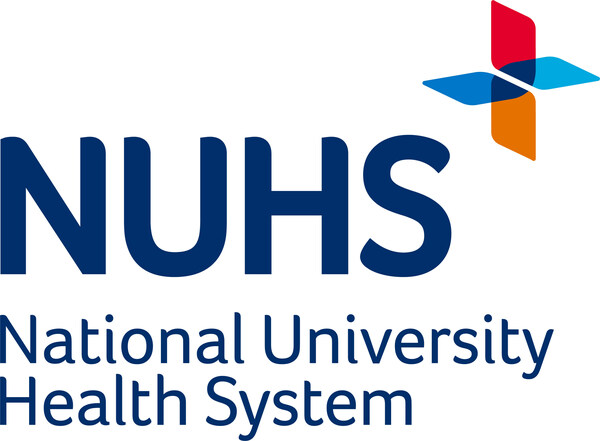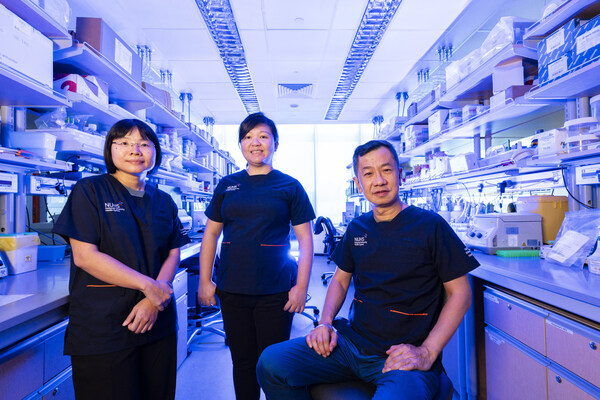 |
Fratricide-resistant CD7 CAR-T therapy by NUS proves effective in treating relapsed or refractory T-cell leukaemia
SINGAPORE, Oct. 5, 2024 /PRNewswire/ -- A new cell therapy, targeting CD7 on leukaemia cells, gives a potentially effective treatment for patients with T-cell acute lymphoblastic leukaemia (T-ALL) who have exhausted all standard treatment options. Published in the prestigious medical journal Nature Medicine on 3 September 2024[1], the study highlights the effectiveness of a new chimeric antigen receptor (CAR) T-cell therapy.

Caption: A team of NUS Medicine and NUHS researchers and clinicians have developed a new fratricide-resistant CD7 CAR T-cell therapy that proves effective in treating relapsed or refractory T-cell leukaemia. Photo be credited to the National University Health System (NUHS).
Developed in-house by researchers and clinicians from the Yong Loo Lin School of Medicine at the National University of Singapore (NUS Medicine) and the National University Health System (NUHS), the therapy was given to 17 patients between April 2019 and October 2023 at the National University Hospital (NUH) in Singapore and Ospedale Pediatrico Bambino Gesù in Rome, Italy.
All the 17 patients, ranging from two to 72 years of age, had T-ALL that could not be eliminated with chemotherapy or had relapsed after treatment. Using a technology developed in Professor Dario Campana's laboratory under the Department of Paediatrics at NUS Medicine, the patient's own T cells were reprogrammed to express an anti-CD7 CAR, and then re-infused into the patients. The anti-CD7 CAR protein redirects the CAR T-cells to kill T-leukaemia cells that have CD7 protein on their surface.
Notably, 16 of the 17 patients achieved complete remission within one month, and leukaemic cells became undetectable even with ultra-sensitive flow cytometry tests that can detect one leukaemia cell in the background of 10,000 normal cells, developed by Ms Elaine Coustan-Smith's laboratory at NUS Medicine. The same techniques were key to analyse CD7 expression in leukaemic cells and determining patient eligibility as well as to monitor expansion and persistence of CAR-T cells after infusion. The first patient treated with this therapy has been in remission for five years, without needing additional chemotherapy or a bone marrow transplant.
The treatment was well-tolerated, and side effects were mild, given the fact that all patients enrolled had a high tumour burden and had received prolonged and intensive treatment prior to CAR-T therapy.
T-ALL accounts for approximately 10 per cent of ALL cases in children and 25 to 30 per cent in adolescents and young adults[2],[3]. Although 70 to 80 per cent of children are cured with intensive and prolonged chemotherapy, the cure rate in adults remains approximately 60 per cent or lower[4].
Patients with relapsed or refractory T-ALL have less than 10 per cent survival, while in this series, 50 per cent survived. This fratricide-resistant CD7 CAR-T therapy is being trialled in NUH.
Dr Bernice Oh, the first author of the study and a Consultant in the Division of Paediatric Haematology and Oncology at the Khoo Teck Puat – National University Children's Medical Institute (KTP-NUCMI), NUH, said: "This CAR-T therapy is a new and promising tool to treat T-ALL patients who have failed conventional treatment. These patients had exhausted all potentially curative options, and we are heartened that we could give them another clear chance at cure without severe side-effects. We are committed to seek better cures for patients with complex and treatment-resistant cancers."
Professor Allen Yeoh, who led the clinical application of this new technology and is Head and Senior Consultant in the Division of Paediatric Haematology and Oncology at NUH's KTP-NUCMI and the National University Cancer Institute, Singapore, said: "While we celebrate this wonderful milestone, we are only at the beginning of this exciting journey. There is a lot of scientific and medical enquiry to understand how to better use CD7 CAR T-cells. Each patient, in this series, taught us a lot. Ultimately, for every member of our team, seeing each patient smile and given another chance, after achieving remission, is priceless." Professor Yeoh is also the VIVA-Goh Foundation Professor in Paediatric Oncology at NUS Medicine.
This research is supported by the Singapore Ministry of Health through the National Medical Research Council (NMRC) Office, MOH Holdings Pte Ltd under the NMRC Singapore Translational Research Investigator Award (MOH-000708), NMRC Research Training Fellowship (MOH-000616), NMRC Clinician Scientist Award (NMRC/CSA/003/2008 and NMRC/CSA/0053/2013) and NMRC Centre Grant (NMRC/CG/NCIS/2010), as well as the Cancer Science Institute of Singapore, National University of Singapore, the Goh Foundation, Children's Cancer Foundation, Singapore Totalisator Board, Bone Marrow Donor Programme (Singapore) and VIVA Foundation for Children with Cancer.
About the National University Health System (NUHS)
The National University Health System (NUHS) aims to transform how illness is prevented and managed by discovering causes of disease, development of more effective treatments through collaborative multidisciplinary research and clinical trials, and creation of better technologies and care delivery systems in partnership with others who share the same values and vision.
Institutions in the NUHS Group include the National University Hospital, Ng Teng Fong General Hospital, Jurong Community Hospital and Alexandra Hospital; three National Specialty Centres - National University Cancer Institute, Singapore (NCIS), National University Heart Centre, Singapore (NUHCS) and National University Centre for Oral Health, Singapore (NUCOHS); the National University Polyclinics (NUP); Jurong Medical Centre; and three NUS health sciences schools – NUS Yong Loo Lin School of Medicine (including the Alice Lee Centre for Nursing Studies), NUS Faculty of Dentistry and NUS Saw Swee Hock School of Public Health.
With member institutions under a common governance structure, NUHS creates synergies for the advancement of health by integrating patient care, health science education and biomedical research.
As a Regional Health System, NUHS works closely with health and social care partners across Singapore to develop and implement programmes that contribute to a healthy and engaged population in the Western part of Singapore.
For more information, please visit www.nuhs.edu.sg.
About the National University Hospital (NUH)
The National University Hospital (NUH) is Singapore's leading university hospital. While the hospital at Kent Ridge first received its patients on 24 June 1985, our legacy started from 1905, the date of the founding of what is today the NUS Yong Loo Lin School of Medicine. NUH is the principal teaching hospital of the medical school.
Our unique identity as a university hospital is a key attraction for healthcare professionals who aspire to do more than practise tertiary medical care. We offer an environment where research and teaching are an integral part of medicine, and continue to shape medicine and transform care for the community we care for.
We are an academic medical centre with over 1,200 beds, serving more than one million patients a year with over 50 medical, surgical and dental specialties. NUH is the only public and not-for-profit hospital in Singapore to provide trusted care for adults, women and children under one roof, including the only paediatric kidney and liver transplant programme in the country.
The NUH is a key member of the National University Health System (NUHS), one of three public healthcare clusters in Singapore.
For more information, please visit: www.nuh.com.sg.
About the National University Cancer Institute, Singapore
The National University Cancer Institute, Singapore (NCIS) is an academic, national specialist centre for cancer under the National University Health System (NUHS), and is the only public cancer centre in Singapore that treats both paediatric and adult cancers in one facility.
As one of two national cancer centres in Singapore, NCIS (pronounced as "n-sis") offers a broad spectrum of cancer care and management from screening, diagnosis and treatment to rehabilitation and survivorship, as well as palliative and long-term care. NCIS' strength lies in the multi-disciplinary approach taken by our clinician scientists and clinician-investigators to develop a comprehensive and personalised plan for each cancer patient
NCIS provides the full suite of specialised oncology and haematology services at the NUH Medical Centre at Kent Ridge, Singapore, including those by the NCIS Chemotherapy Centre, NCIS Radiotherapy Centre and NCIS Cellular Therapy Centre.
NCIS also offers cancer services at other hospitals in Singapore:
- NCIS Cancer & Blood Clinic @ Ng Teng Fong General Hospital
- NCIS Radiotherapy Centre @ Tan Tock Seng Hospital
- NCIS Radiotherapy Clinic @ Khoo Teck Puat Hospital
To bring cancer care even closer to our patients, our NCIS on the Go programme delivers a range of cancer services at clinics within the community for their convenience.
For more information, please visit www.ncis.com.sg.
About the Yong Loo Lin School of Medicine, National University of Singapore (NUS Medicine)
The NUS Yong Loo Lin School of Medicine is Singapore's first and largest medical school. Our enduring mission centres on nurturing highly competent, values-driven and inspired healthcare professionals to transform the practice of medicine and improve health around the world.
Through a dynamic and future-oriented five-year curriculum that is inter-disciplinary and inter-professional in nature, our students undergo a holistic learning experience that exposes them to multiple facets of healthcare and prepares them to become visionary leaders and compassionate doctors and nurses of tomorrow. Since the School's founding in 1905, more than 12,000 graduates have passed through our doors.
In our pursuit of health for all, our strategic research programmes focus on innovative, cutting-edge biomedical research with collaborators around the world to deliver high impact solutions to benefit human lives.
The School is the oldest institution of higher learning in the National University of Singapore and a founding institutional member of the National University Health System. It is one of the leading medical schools in Asia and ranks among the best in the world (Times Higher Education World University Rankings 2024 by subject and the Quacquarelli Symonds (QS) World University Rankings by subject 2023).
For more information about NUS Medicine, please visit https://medicine.nus.edu.sg/
About the National Medical Research Council (NMRC)
The NMRC was established in 1994 to oversee research funding from the Ministry of Health and support the development and advancement of biomedical research in Singapore, particularly in the public healthcare clusters and medical schools. NMRC engages in research strategy and planning, provides funding to support competitive research grants and core research enablers, and is responsible for the development of clinician scientists through awards and fellowships. The council's work is supported by the NMRC Office which is part of MOH Holdings Pte Ltd. Through its management of the various funding initiatives, NMRC promotes healthcare research in Singapore, for better health and economic outcomes.
[1] Oh, B.L.Z., Shimasaki, N., Coustan-Smith, E. et al. Fratricide-resistant CD7-CAR T cells in T-ALL. Nat Med (2024). https://doi.org/10.1038/s41591-024-03228-8 |
[2] Teachey, D. T. & Pui, C.-H. Comparative features and outcomes between paediatric T-cell and B-cell acute lymphoblastic leukaemia. Lancet Oncol. 20, e142–e154 (2019). |
[3] Raetz, E. A. et al. Outcome for children and young adults with T-cell ALL and induction failure in contemporary trials. J. Clin. Oncol. 41, 5025–5034 (2023). |
[4] Abaza, Y. et al. Hyper-CVAD plus nelarabine in newly diagnosed adult T-cell acute lymphoblastic leukemia and T-lymphoblastic lymphoma. Am. J. Hematol. 93, 91–99 (2018). |
source: National University Health System (NUHS)
想要獨家投資理財Tips?即Like etnet 全新Facebook專頁► 立即讚好































